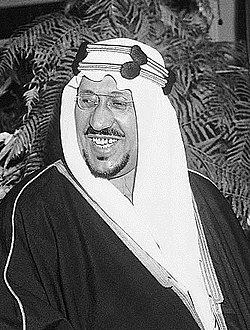Abdulaziz bin Abdul Rahman

Reign: 23 September 1932 – 9 November 1953
- King Abdulaziz Air Base
- King Abdulaziz Center For National Dialogue
- King Abdulaziz Center for World Culture
- King Abdulaziz City for Science and Technology
- King Abdul Aziz Historical Centre
- King Abdul Aziz Hospital, Mecca
- King Abdulaziz International Airport
- King Abdulaziz Medical City, Riyadh
- King Abdulaziz Medical City, Jeddah
- King Abdul Aziz Military College
- King Abdul Aziz Mosque
- King Abdulaziz Mosque, Riyadh
- King Abdulaziz Naval Base
- King Abdulaziz Park, Riyadh
- King Abdul Aziz Port
- King Abdulaziz Public Library
- King Abdul Aziz Road, Kuwait
- King Abdul Aziz Stadium
- King Abdulaziz University
- King Abdulaziz University College of Health Sciences





